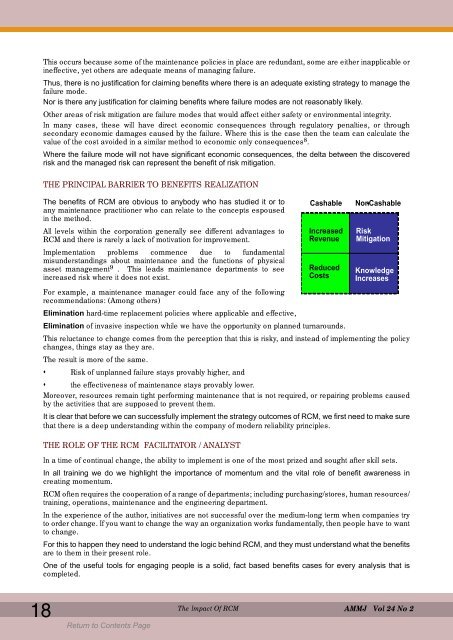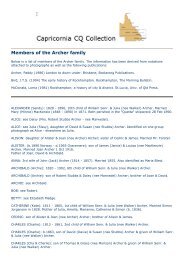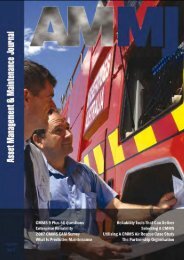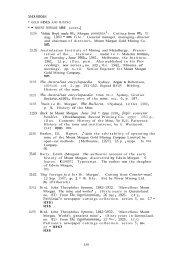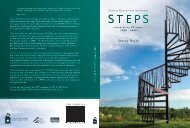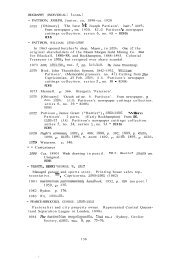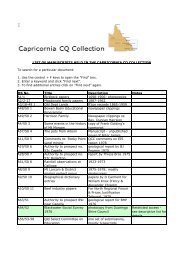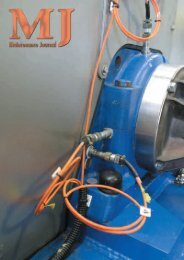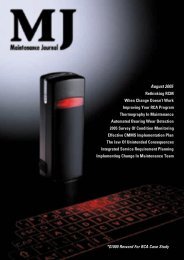April - Library
April - Library
April - Library
You also want an ePaper? Increase the reach of your titles
YUMPU automatically turns print PDFs into web optimized ePapers that Google loves.
This occurs because some of the maintenance policies in place are redundant, some are either inapplicable or<br />
ineffective, yet others are adequate means of managing failure.<br />
Thus, there is no justification for claiming benefits where there is an adequate existing strategy to manage the<br />
failure mode.<br />
Nor is there any justification for claiming benefits where failure modes are not reasonably likely.<br />
Other areas of risk mitigation are failure modes that would affect either safety or environmental integrity.<br />
In many cases, these will have direct economic consequences through regulatory penalties, or through<br />
secondary economic damages caused by the failure. Where this is the case then the team can calculate the<br />
value of the cost avoided in a similar method to economic only consequences 8 .<br />
Where the failure mode will not have significant economic consequences, the delta between the discovered<br />
risk and the managed risk can represent the benefit of risk mitigation.<br />
THE PRINCIPAL BARRIER TO BENEFITS REALIZATION<br />
The benefits of RCM are obvious to anybody who has studied it or to<br />
any maintenance practitioner who can relate to the concepts espoused<br />
in the method.<br />
All levels within the corporation generally see different advantages to<br />
RCM and there is rarely a lack of motivation for improvement.<br />
Implementation problems commence due to fundamental<br />
misunderstandings about maintenance and the functions of physical<br />
asset management 9 . This leads maintenance departments to see<br />
increased risk where it does not exist.<br />
For example, a maintenance manager could face any of the following<br />
recommendations: (Among others)<br />
Elimination hard-time replacement policies where applicable and effective,<br />
Elimination of invasive inspection while we have the opportunity on planned turnarounds.<br />
This reluctance to change comes from the perception that this is risky, and instead of implementing the policy<br />
changes, things stay as they are.<br />
The result is more of the same.<br />
• Risk of unplanned failure stays provably higher, and<br />
• the effectiveness of maintenance stays provably lower.<br />
Moreover, resources remain tight performing maintenance that is not required, or repairing problems caused<br />
by the activities that are supposed to prevent them.<br />
It is clear that before we can successfully implement the strategy outcomes of RCM, we first need to make sure<br />
that there is a deep understanding within the company of modern reliability principles.<br />
THE ROLE OF THE RCM FACILITATOR / ANALYST<br />
In a time of continual change, the ability to implement is one of the most prized and sought after skill sets.<br />
In all training we do we highlight the importance of momentum and the vital role of benefit awareness in<br />
creating momentum.<br />
RCM often requires the cooperation of a range of departments; including purchasing/stores, human resources/<br />
training, operations, maintenance and the engineering department.<br />
In the experience of the author, initiatives are not successful over the medium-long term when companies try<br />
to order change. If you want to change the way an organization works fundamentally, then people have to want<br />
to change.<br />
For this to happen they need to understand the logic behind RCM, and they must understand what the benefits<br />
are to them in their present role.<br />
One of the useful tools for engaging people is a solid, fact based benefits cases for every analysis that is<br />
completed.<br />
18<br />
The Impact Of RCM<br />
Cashable Non-Cashable<br />
Increased<br />
Revenue<br />
Reduced<br />
Costs<br />
Risk<br />
Mitigation<br />
Knowledge<br />
Increases<br />
AMMJ Vol 24 No 2


